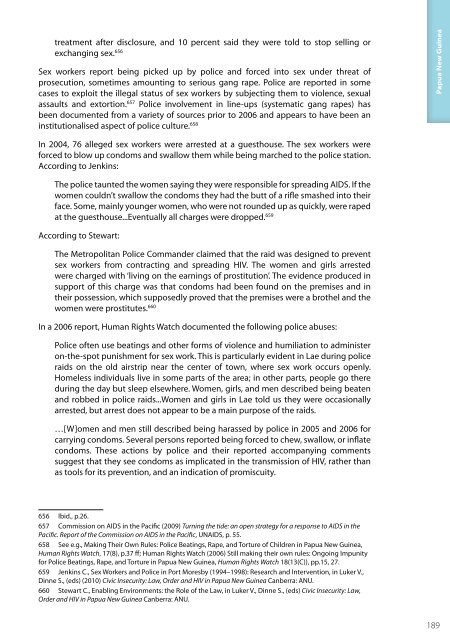SEX WORK AND THE LAW - HIV/AIDS Data Hub
SEX WORK AND THE LAW - HIV/AIDS Data Hub
SEX WORK AND THE LAW - HIV/AIDS Data Hub
You also want an ePaper? Increase the reach of your titles
YUMPU automatically turns print PDFs into web optimized ePapers that Google loves.
treatment after disclosure, and 10 percent said they were told to stop selling or<br />
exchanging sex. 656<br />
Sex workers report being picked up by police and forced into sex under threat of<br />
prosecution, sometimes amounting to serious gang rape. Police are reported in some<br />
cases to exploit the illegal status of sex workers by subjecting them to violence, sexual<br />
assaults and extortion. 657 Police involvement in line-ups (systematic gang rapes) has<br />
been documented from a variety of sources prior to 2006 and appears to have been an<br />
institutionalised aspect of police culture. 658<br />
Papua New Guinea<br />
In 2004, 76 alleged sex workers were arrested at a guesthouse. The sex workers were<br />
forced to blow up condoms and swallow them while being marched to the police station.<br />
According to Jenkins:<br />
The police taunted the women saying they were responsible for spreading <strong>AIDS</strong>. If the<br />
women couldn’t swallow the condoms they had the butt of a rifle smashed into their<br />
face. Some, mainly younger women, who were not rounded up as quickly, were raped<br />
at the guesthouse...Eventually all charges were dropped. 659<br />
According to Stewart:<br />
The Metropolitan Police Commander claimed that the raid was designed to prevent<br />
sex workers from contracting and spreading <strong>HIV</strong>. The women and girls arrested<br />
were charged with ‘living on the earnings of prostitution’. The evidence produced in<br />
support of this charge was that condoms had been found on the premises and in<br />
their possession, which supposedly proved that the premises were a brothel and the<br />
women were prostitutes. 660<br />
In a 2006 report, Human Rights Watch documented the following police abuses:<br />
Police often use beatings and other forms of violence and humiliation to administer<br />
on-the-spot punishment for sex work. This is particularly evident in Lae during police<br />
raids on the old airstrip near the center of town, where sex work occurs openly.<br />
Homeless individuals live in some parts of the area; in other parts, people go there<br />
during the day but sleep elsewhere. Women, girls, and men described being beaten<br />
and robbed in police raids...Women and girls in Lae told us they were occasionally<br />
arrested, but arrest does not appear to be a main purpose of the raids.<br />
…[W]omen and men still described being harassed by police in 2005 and 2006 for<br />
carrying condoms. Several persons reported being forced to chew, swallow, or inflate<br />
condoms. These actions by police and their reported accompanying comments<br />
suggest that they see condoms as implicated in the transmission of <strong>HIV</strong>, rather than<br />
as tools for its prevention, and an indication of promiscuity.<br />
656 Ibid., p.26.<br />
657 Commission on <strong>AIDS</strong> in the Pacific (2009) Turning the tide: an open strategy for a response to <strong>AIDS</strong> in the<br />
Pacific. Report of the Commission on <strong>AIDS</strong> in the Pacific, UN<strong>AIDS</strong>, p. 55.<br />
658 See e.g., Making Their Own Rules: Police Beatings, Rape, and Torture of Children in Papua New Guinea,<br />
Human Rights Watch, 17(8), p.37 ff; Human Rights Watch (2006) Still making their own rules: Ongoing Impunity<br />
for Police Beatings, Rape, and Torture in Papua New Guinea, Human Rights Watch 18(13(C)), pp.15, 27.<br />
659 Jenkins C., Sex Workers and Police in Port Moresby (1994–1998): Research and Intervention, in Luker V.,<br />
Dinne S., (eds) (2010) Civic Insecurity: Law, Order and <strong>HIV</strong> in Papua New Guinea Canberra: ANU.<br />
660 Stewart C., Enabling Environments: the Role of the Law, in Luker V., Dinne S., (eds) Civic Insecurity: Law,<br />
Order and <strong>HIV</strong> in Papua New Guinea Canberra: ANU.<br />
189
















